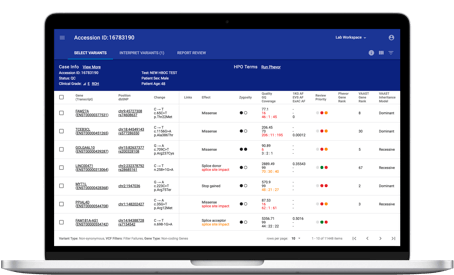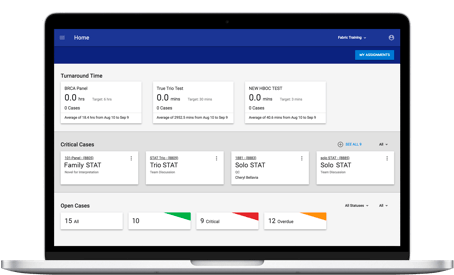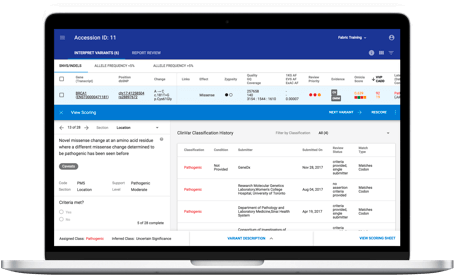Applications of Fabric Enterprise
Enabling precision medicine through algorithm-guided assessment of NGS data in inherited disease, and rare disease.
 Diagnostic Odyssey
Diagnostic Odyssey
Fabric Enterprise powers industry-leading diagnostic yields in diagnostic odyssey cases. By combining deep phenotype data with genotype data using machine learning, Fabric accurately identifies and prioritizes disease causing variants in rare idiopathic disease. Yields up to 50% compared to 25-30% industry average.
 Rapid Whole-Genome in NICU/PICU
Rapid Whole-Genome in NICU/PICU
Fabric Enterprise accelerates WGS interpretation to diagnose genetic disorders in acutely ill infants. Advanced algorithmic prioritization brings focus to the most phenotypically relevant, causative variants in time-critical situations. Physician-ready report in less than 2 hours for whole genomes.
 Hereditary Panels
Hereditary Panels
Fabric Enterprise enables clinical reporting for hereditary disease panels with accurate and rapid interpretation. With comprehensive annotations, ACMG classification powered by ACE, Fabric’s AI variant classification engine, and a proprietary variant knowledgebase, labs can quickly generate physician-ready, customized clinical reports.
 Clinical Report
Clinical Report
We provide reports that can be fully adapted to each customer, including their own branding—delivering a true Sequence-to-Clinical Report solution.
Our optimized secondary analysis pipeline takes FASTQ files, generates relevant QC metrics and VCF output, and then Fabric combines comprehensive annotation with proven variant prioritization to produce a physician-ready, customized clinical report.
Time is of the essence, particularly with newborns who may not exhibit classic symptoms of genetic disorders. Our rapid Whole Genome Sequencing pipeline has been calibrated to dramatically reduce the time needed to detect the cause of genetic illness. The Fabric Genomics’ interpretation platform enables us to quickly analyze the results and apply the insights to pediatric patient care.
STEPHEN KINGSMORE, M.D., D.SC., President and CEO
Key Benefits
Increased Diagnostic Yield Using Algorithmic Prioritization
Identify the causative variant quickly and accurately with diagnostic yields of up to 50% versus industry average of 25-30%, by using GEM, VAAST, Phevor, and VVP algorithms to systematically prioritize variants based on severity in conjunction with a patient’s phenotype
Rapid Turnaround Time
Reduce test turnaround time and generate clinically actionable results, while increasing test throughput using configurable SOP-based workflows. Clinical reports are ready for sign out in less than two hours for whole genome sequence data.
Sequence to Clinical Report
Our optimized secondary analysis pipeline takes FASTQs, generates relevant QC metrics and VCF output. Fabric then combines comprehensive annotation with proven variant prioritization to generate a physician-ready customized clinical report.



